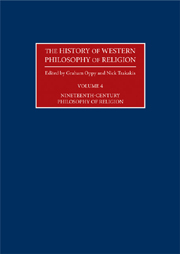Book contents
- Frontmatter
- Contents
- Editorial Introduction
- Contributors
- 1 Nineteenth-Century Philosophy of Religion: An Introduction
- 2 Johann Gottlieb Fichte
- 3 Friedrich Schleiermacher
- 4 G. W. F. Hegel
- 5 Friedrich Schelling
- 6 Arthur Schopenhauer
- 7 Auguste Comte
- 8 John Henry Newman
- 9 Ralph Waldo Emerson
- 10 Ludwig Feuerbach
- 11 John Stuart Mill
- 12 Charles Darwin
- 13 Søren Kierkegaard
- 14 Karl Marx and Friedrich Engels
- 15 Wilhelm Dilthey
- 16 Edward Caird
- 17 Charles S. Peirce
- 18 Friedrich Nietzsche
- 19 Josiah Royce
- 20 Sigmund Freud
- 21 Émile Durkheim
- Chronology
- Bibliography
- Index
5 - Friedrich Schelling
- Frontmatter
- Contents
- Editorial Introduction
- Contributors
- 1 Nineteenth-Century Philosophy of Religion: An Introduction
- 2 Johann Gottlieb Fichte
- 3 Friedrich Schleiermacher
- 4 G. W. F. Hegel
- 5 Friedrich Schelling
- 6 Arthur Schopenhauer
- 7 Auguste Comte
- 8 John Henry Newman
- 9 Ralph Waldo Emerson
- 10 Ludwig Feuerbach
- 11 John Stuart Mill
- 12 Charles Darwin
- 13 Søren Kierkegaard
- 14 Karl Marx and Friedrich Engels
- 15 Wilhelm Dilthey
- 16 Edward Caird
- 17 Charles S. Peirce
- 18 Friedrich Nietzsche
- 19 Josiah Royce
- 20 Sigmund Freud
- 21 Émile Durkheim
- Chronology
- Bibliography
- Index
Summary
The place of Friedrich Wilhelm Joseph Schelling (1775–1854) in the history of European philosophy is easily located: he was one of the major German thinkers who, in the wake of Kant's critical turn, elaborated the ambitious systematic philosophy know as ‘absolute idealism’, and the first of those thinkers to repudiate the rampant conceptualism of the idealist approach and to stress instead the priority of actuality over conceptual possibility. Woven throughout the fabric of the writings and lectures he produced over more than half a century is an enduring preoccupation with the question of God. Yet this is but one thread in Schelling's rich intellectual tapestry, one always interwoven with four counterparts: nature; the being both displayed and concealed in human reality; freedom or the peculiar moral-psychological status of ‘personality’, which only a free being (God included) can attain through a temporal process; and the divine actuality. These five elements -deity or godhead, nature, humankind, freedom and the historical process towards actual personhood – are not easily separated in Schelling's thinking, nor are these easily detached from the historical paradigms that Schelling used to integrate them: Platonic and Christian creation theologies; the heterodox process theologies of Jacob Bohme and earlier Christian mystics; and, finally, the audacious anthropocentrism of Kant's critical idealism, founded on the Copernican turn that finds in phenomena only such meaning as human understanding and moral reason can impute to them.
- Type
- Chapter
- Information
- The History of Western Philosophy of Religion , pp. 61 - 80Publisher: Acumen PublishingPrint publication year: 2009

